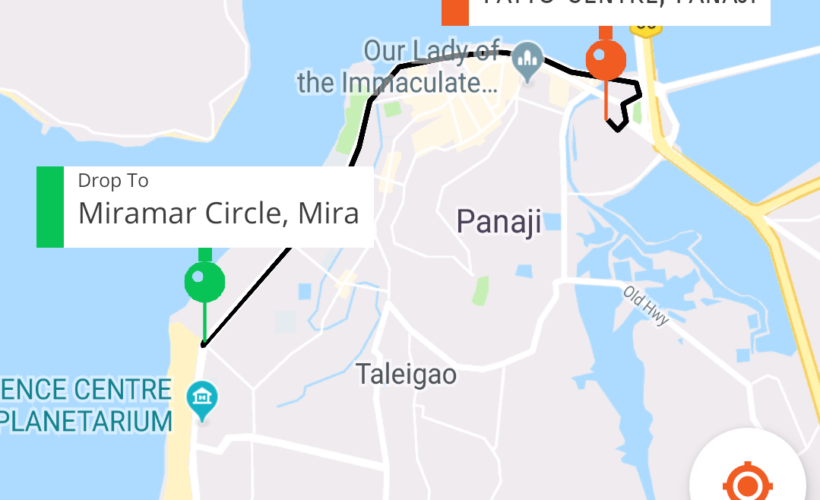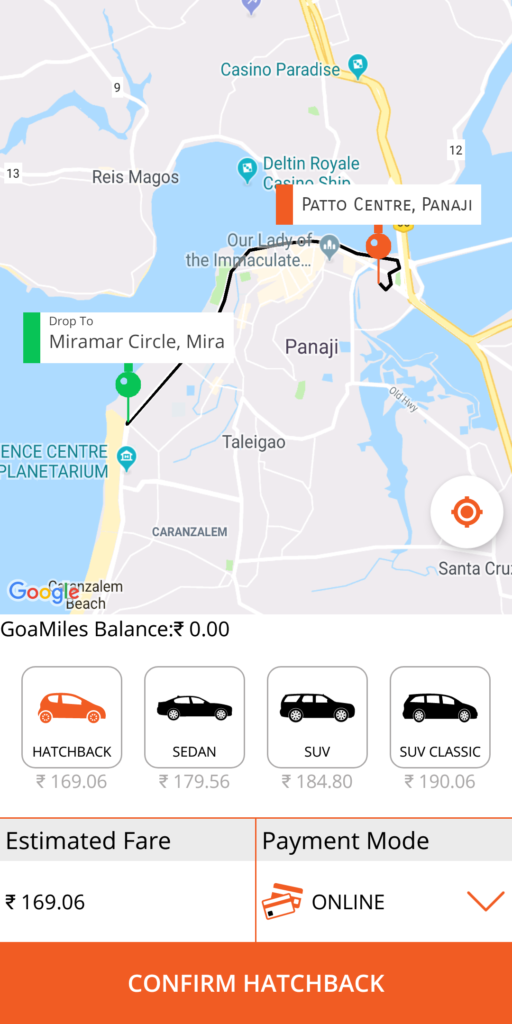
The current model of Goa Miles seems to be targeted at tourists, not locals
By RAMRAI NAIK

Taxi aggregators have been a major success all over the world. Ola, an Indian taxi-hailing app, has now penetrated markets in some of the most developed nations like UK and Australia. The state of Goa, however, has been waiting for a tech option in the taxi sector for a long time now.
From the tourism perspective, it has been a need for some time now, and has also seen an emerging demand from locals. Some time ago, netizens and civil society proved public consensus on the issue through an online petition. However, the local taxi operators consistently succeeded in thwarting any attempts to start alternate taxi services in the state.
But the Government of Goa, no longer able to ignore this growing need, recently launched its own taxi-hailing app called Goa Miles. The app is an initiative of the Goa Tourism Development Corporation GTDC and is developed by Frotamiles Pvt Ltd, a subsidiary of Pune-based PITASYS Softwares Pvt Ltd.
The app has come as a huge relief to commuters in the state, but many concerns have been raised about it. While rates are on the higher side, these are stable and consistent. The app is available on android as well as iOS devices, but appears to have a few technical glitches. One has to manually pin the pick-up location, which can be problematic for tourists in isolated and unknown areas.
People have also taken to social media to complain that there aren’t enough cars to meet the demand. Another major issue is that the app cannot identify the shortest possible route to the destination, so passengers end up paying for the longest routes.
Although these might be dismissed as teething problems, stakeholders in the IT sector have raised doubts over the selection of the Pune-based company to develop the service when the government repeatedly speaks of empowering locals.
Since the launch of the app, there has been a huge surge in downloads on both mobile platforms.
Despite the high downloads, it is unlikely that locals will use the service due to the exorbitant pricing. But at least locals know that an option is available, in times of emergency.
Many of the app’s features as well as interface are in line with market leaders like Ola and Uber, which includes panic button, real-time location of the cab, digital payments, information of the drivers, etc. GTDC has assured users that background checks on drivers will be conducted regularly.
Varun Priolkar, an IT professional, feels that there is a danger of Goa Miles becoming a monopoly due to absence of competition. According to Priolkar, “Private aggregators can compete with each other to give both consumers and taxi drivers the best deal. In a monopoly, one can easily gouge prices without checks and balances.”
Priolkar continues, “The positives from moving from a completely offline system that we previously had would be more transparency, easier feeding of location, better safety, no need to pay for two-way prices.” Priolkar added that the taxi business model is sustainable and doesn’t need an overhaul from its inherent state. He says, “The real challenge would not be in terms of technology, but in terms of adoption. Taxi unions will do anything and everything to stifle any change or transparency. The promoters of the app make a 12% cut on every ride, which is reasonable and enough to make profits.”
Shelton Desousa believes that the government should have had a soft pre-launch to test the app with a small community of drivers and customers for feedback. “It should have begun with a dialogue with the taxi community to train and get them on board. Information should have been provided and long term plans discussed. Initial data should have been analysed to support the pricing calculations, while standard terms and conditions as well as privacy of data should have been discussed,” former sales executive Desousa said.
Desousa added that it made sense for the state government to have its own app as the taxi operators form a powerful lobby in the tourist state, as a result of which there are political implications when it comes to any major decision that might affect them. He is certain that the government will be able to find a perfect balance and set terms favourable to taxi drivers, tourists as well as fellow locals.
Goa Miles was launched at Secretariat Complex in Porvorim by Chief Minister Manohar Parrikar on August 6. On the other side, at Dabolim Airport, a huge protest against the cab-based service broke out. Opposing the Goa Miles counter at the airport, taxi operators alleged that booking point to point on the counter was illegal.
Four days later, on August 10, more than 100 taxi operators quit the app. A week later, the protests only seemed to be growing as an increasing number of taxi operators have expressed their unhappiness over the prospects of their profits being affected by the new service.
“Protests are inevitable when a new service is being launched, but this government is continuously listening to demands and will try to implement whatever is possible for us. We are requesting all the taxi drivers to register themselves under this app; in the long term, there will be many benefits,” Tourism Minister Manohar Azgaonkar said speaking to Business Goa.
Further, Azgaonkar emphasised that the main reason behind starting the app-based taxi service was to bring predictability in pricing, in addition to discipline in service. When asked about the high rates, the Minister said that the rates will be rationalized in due course of time to make it affordable to all locals.
President of Travel and Tourism Association of Goa Savio Messias said that allowing private players into the app service would have made more sense as cab aggregators are well equipped with the technology and expertise that are tested at the global level.
When asked to comment on the protest, Messias said, “Technology has to be implemented in every field. It brings efficiency to any business and there is no turning a blind eye to that. The hotel industry has been revolutionalised by the application of technology; they don’t need to market their properties anymore as this is now done by apps. Similarly, taxi operators will get more business through this initiative. It will also ensure that their cars don’t remain idle.”
On the day the app was launched, CM Parrikar claimed the app would increase drivers’ income “by 2-3 times”. Judging by the response from the taxi operators thus far, it appears that the government will need to do more to give the former incentive to join the initiative. Market analysts will have to wait until the tourist season – when business is at its peak for taxi operators – is over to judge if the app is sustainable in the long run

“Technology has to be implemented in every field. It brings efficiency to any business and there is no turning a blind eye to that. Similarly, taxi operators will get more business through this initiative. It will also ensure that their cars don’t remain idle”
Savio Messias
President, Travel and Tourism Association of Goa

“Protests are inevitable when a new service is being launched; but this government is continuously listening to demands and will try to implement whatever is possible for us. We request all taxi drivers to register themselves on this app. In the long term, there will be many benefits”
Manohar Azgaonkar
Tourism Minister





